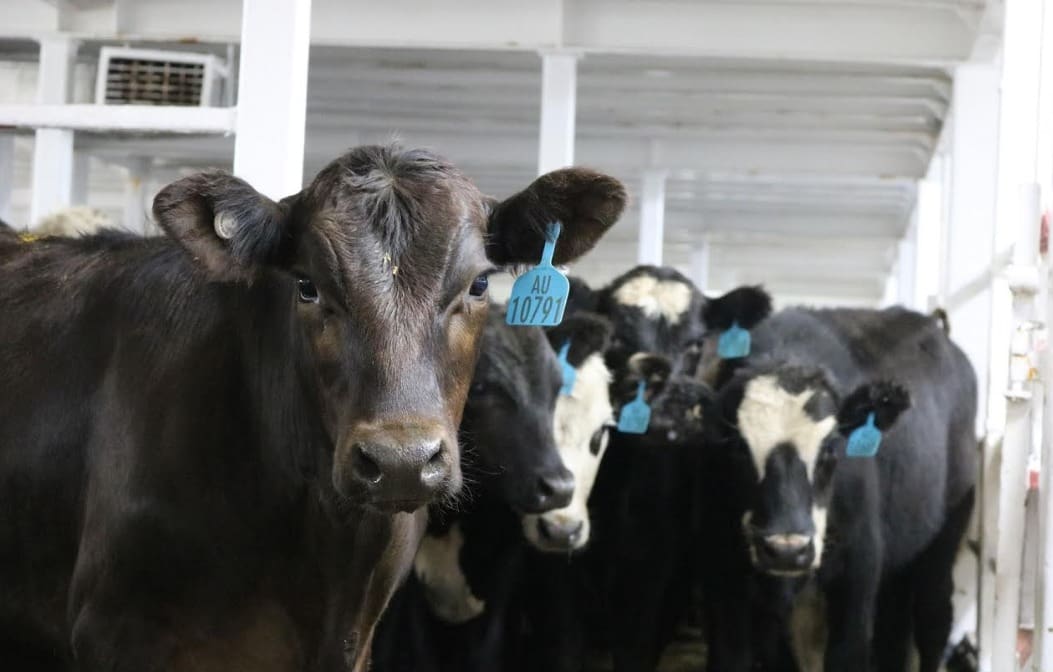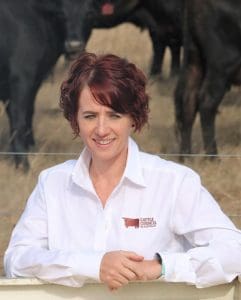
Australian beef cattle on a live export vessel.
CATTLE export shipments from Western Australia have been disrupted by the uncertainty over the continuation of the Middle East live sheep trade from the state.
WA live exporters regularly send some cattle on vessels carrying larger numbers of sheep and it is estimated that 30,000-40,000 cattle that would normally have been shipped to the Middle East this year have not been exported.
Sheep Central believes Livestock Shipping Services has between 7000-10,000 cattle in feedlots and would have shipped 15,000 cattle in recent months on combined sheep-cattle shipments. The company would normally have shipped 15,000 cattle to the Middle East on vessels in coming weeks before the Middle East trade halted.
Victorian-based exporter Otway Livestock Exports recently suspended a shipment of 5000-10,000 sheep and 4000-5000 cattle that was initially scheduled for departure from Fremantle in July for Israel.
Industry uncertainty has escalated since WA exporters Emanuel Exports and its subsidiary EMS Rural Exports had their licences suspended in the aftermath of video footage showing dead and dying overheated sheep on several voyages to the Middle East, including many supplied by Emanuel Exports. This prompted community outrage, government investigations, new loading density rules, legislation to introduce higher penalties for animal welfare infringements and other bills to phase out the Middle East northern summer trade.
Other WA exporters have been reluctant to commit to shipments while there is a threat of a legal injunction by Animals Australia if the Department of Agriculture and Water Resources issues a licence during the northern summer months.
Mr Littleproud and the Department of Agriculture and Water Resources are now investigating if it is possible to bring forward the time at which a licence for a live shipment is approved, to allow any injunction to be heard in court, while stock are held on farms.
Cattle Council oppose any moves to close the sheep trade

Cattle Council SAustralia CEO Margo Andrae
The situation has prompted Cattle Council Australia chief executive officer Margo Andrae to declare the body’s support for the live sheep trade continuing.
“Cattle producers welcome confirmation from both the Coalition and Labor that there is bipartisan support for the continuation of live cattle exports, but we also stand firmly alongside sheep producers in opposing any move to close the live sheep trade,” she said.
She said in the live trade to countries like Turkey, Jordan and Israel, cattle and sheep are typically exported on the same voyage, so any long-haul sheep export ban would decimate the number of cattle shipped to the Middle East.
“That’s why the current hiatus in the Middle East live trade is of great concern.
“Industry estimates are that anywhere between 30,000 to 40,000 cattle which would have been shipped from WA over this winter period haven’t been exported because of the current impasse,” she said.
“These are very significant numbers in terms of WA’s cattle supply chain at this time of year.”
More than half a million cattle have been exported from Australia to Israel alone in the past 10 years. In the 12 months to the end of June 2018, more than 80,000 cattle were exported to the Middle East, predominantly to Israel and Turkey.
Ms Andrae said continual improvement and better risk management in the livestock export industry is a fundamental objective the council shared with exporters and the government.
“A critical part of this is understanding the different heat and humidity factors for Red Sea and Mediterranean shipments, compared to those faced in the Arabian Gulf.”
Ms Andrae said the ACTU’s recently adopted policy to shut-down all live exports from Australia was “a bad call” for producers and for Australia’s entire red meat industry because we know that having competition for our livestock through a diversity markets is important to the profitability and productivity of the entire livestock sector.
Otway cattle-sheep shipment pushed back
Otway Livestock Exports operations manager Jim Teasdale said a shipment of 5000-10,000 sheep and 4000-5000 cattle was initially scheduled for departure from Fremantle in July for Israel.
“The uncertainty over how the department will react or be forced to react by any legal action is a concern to us and to our customer.
“We still may go, but it certainly won’t be before the end of August,” he said.
“That’s largely because our customer can’t rely on the supply of the sheep and they don’t know if their ship is going to be fully utilised either; if we did prepare the sheep and there was a problem, so that puts all our cattle back as well.”
Mr Teasdale said Otway has about 4000 cattle on feed in WA.
“We have regular suppliers of sheep which we have not been able to contract and have had to push back delivery of some cattle.”
Biggest concern is minister’s refusal to meet exporters
Mr Teasdale said his biggest concern is that the minister has not engaged and will not engage with any exporters.
“The biggest concern to us is that the minister won’t sit down with us and discuss this trade with us.”
Mr Littleproud told delegates at the Lambex 2018 conference in Perth last week that the Federal Government would support any exporter prepared to recommence the Middle East trade and will defend any injunction brought against the department. The minister has maintained exporters should be dealing with the Department of Agriculture and Water Resources and Mr Teasdale said he had no problem with DAWR staff.
“But they are a government department and their guidance comes from above – not in what they do every day, but in the way they interpret policy, which will forever be driven by what’s handed down from above.
“If he doesn’t take any leadership and understand what we do and that this can be done successfully, and has been many many times without incident…and excludes himself from that, it will affect the department and how they implement policy,” he said.
“We don’t need him to steer the department or get involved in decisions, but what we need him to do is engage with the exporters and take some time to understand that there are good exporters that have done this successfully on many occasions.
“He should take the time to understand how and why,” Mr Teasdale said.
“He’s doing a disservice to himself and to the industry and to animal welfare by not engaging with the exporters.”
Mr Teasdale said by not engaging with exporters Mr Littleproud was missing the opportunity to fully understand how livestock losses have occurred and how to avoid them in the future.
Otway has never had a reportable mortality in sheep or cattle shipments to the Red Sea, which has a different climate to the Gulf ports, he said.
“Animal welfare is at the front of everything we do and we ship to a closed loop supply chain, so means there is little issue at that end in terms of traceability of livestock.”

Jerry Jameson……Your letter shows the disconnect between cultures, countries and religions.’Eid’ is not just a sacrifice of a animal. God asked Abraham to sacrifice his son and when the moment came God replaced the son with a lamb. The idea of Eid al Adha is about surrendering to your faith and God. The lamb that is sacrificed is always shared with the poor and never wasted. Killing a sheep outside the boundaries of a abattoir may seem barbaric to our sensitivities but you must remember that under Islam the animal must be killed as humanely and respectful as possible. Full names required in future for reader comments please Russell S, as per Sheep Central’s long-standing comments policy: https://www.sheepcentral.com/about-us/sheep-central-comment-policy/ Editor.
Quite personally, I am very pleased Animals Australia are taking such an interest in this industry. Footage shows,just how callous and uncaring some exporters have been over very many decades. I am a strong supporter of all their work both financial and advocacy.
I am also strongly opposed to any trade with Arab nations. Their methods of slaughter have been shown as being totally at odds with our Western culture.The other matter which has always concerned me is the Festival of Sacrifice, which has included Australian sheep being sold illegally at the Al-Rai market place in Kuwait for the purpose of live sacrifice. This alone is very distressing. Although I am sympathetic to farmers and truckers etc. who are involved in this controversy, I cannot get past the fact that no matter what restrictions are placed on live exports, animals will still suffer and this I cannot condone.
Animals Australia and PETA are commanding too much of the argument to close down live export.
We share and understand the Minister’s concern at the footage aired a couple of months from voyages that were completed last year.
We welcome the opportunity to share our experiences of how well-equipped, trained and experienced people (farmers, transport, quarantine, stockmen and women, vets and ships crew) regularly ensure Australian livestock are exported successfully.
We are not on a witch hunt, looking for someone to take the blame – simply to take responsibility. To me, that means engaging with the very people and businesses that have the ability to ensure the continuation of this trade. Producers, truck owners and drivers, feed producers, stockmen and women, and stevedores are all affected, but can they resume the trade?
Among other basic livestock preparation and management procedures, sheep should be afforded more space when travelling from the southern winter to the northern summer. But if we said every long-haul truck or train in Australia had to run 30 percent empty, would that be viable? In any case, scientific risk-based modelling already reduces stocking rates on some ships through this period by up to 22pc – provided it is followed.
Australian Government-accredited vets already travel on voyages to the Middle East. They are required to independently report to the government and the exporter daily and to stay until all animals are safely unloaded.
It is frustrating that the rule of the lowest common denominator is imposed on a whole industry from a rushed report based on a single vet’s non-peer reviewed opinion. The report has some useful and valid points, but would this type of implementation be acceptable elsewhere?
The current arrangements are not viable. They have created uncertainty for the whole supply chain and for the department.
I’m not a political person; perhaps made clear by the lack of tact in some of my comments. Leadership should come from above and with effective regulation, not t,o be confused with more administration. Give the department a big stick to use sparingly but decisively.
Take recent events in the Australian Football League. Maybe something like the footy tribunal; measure the intent and the damage and punish accordingly. Some good players might miss some important games, but everyone else who plays fairly — or didn’t have a brain fade — gets to carry on knowing if they reckless or careless the threat of suspension is real.